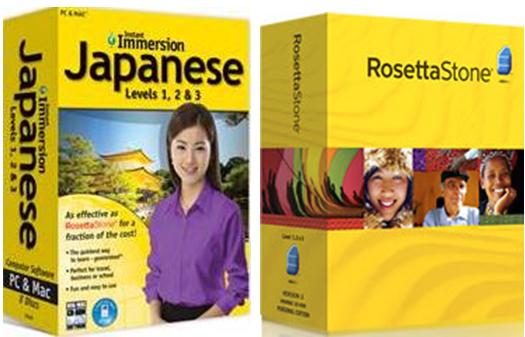Western District Dismisses Trade Dress Case in Favor of Virginia Suit
 Trade dress questions between Topics (left) and
Trade dress questions between Topics (left) and
Rosetta Stone (right) will be decided in the Eastern District of Virginia
Folks may recall the suit Topics Entertainment Inc. filed last year in the Western District seeking a declaration that its packaging does not infringe any rights owned by competing language software maker Rosetta Stone Ltd. (STL post here.)
In particular, Topics asked the court to find that its “use of the color yellow, black font lettering, small blue icons, and pictures of smiling individuals is proper and not in violation of any rights held by Rosetta,” and that “Rosetta has no trademark or trade dress rights to the color yellow, black lettering, small blue icons, or pictures of smiling individuals.”
Topics’ filing beat Rosetta Stone’s mirror image filing in the Eastern District of Virginia by two hours.
Rosetta Stone moved to dismiss the Western District action.
On Nov. 12, 2009, the Eastern District of Virginia stayed the Virginia action pending the Western District’s ruling on Rosetta Stone’s motion. It found: “[I]t is for the court in the Western District of Washington to decide whether the first-to-file rule applies.”
On Jan. 4, the Western District Judge Robert Lasnik concluded the first-to-file rule should not apply and the case should be litigated in Virginia.
The court found: “Although Topics states that it filed suit only after the parties’ negotiations reached an impasse, the record demonstrates that at the time, the parties were still engaged in active settlement negotiations. In fact, on Monday, October 5, Rosetta Stone’s counsel promised that the company would provide a new settlement proposal by Wednesday, October 7. Rather than waiting for the proposal, Topics filed suit. Its counsel’s e-mail notes the awaited settlement proposal and explains the rush to file suit: ‘We do want to see Rosetta’s proposal …. And, as I advised before, we do not want to give up the rights associated with having filed first.’ The record shows that while the parties were engaged in active settlement negotiations, Topics became concerned when Rosetta Stone would not agree to permit it to file its lawsuit first and rushed to file its lawsuit. In light of these facts, the Court finds that Topics’ lawsuit was anticipatory. Moreover, permitting Topics to gain from its tactic would encourage parties to precipitously abandon settlement negotiations to rush to the courthouse as Topics did.”
The court added: “[W]here, as here, ‘a declaratory judgment action has been triggered by a cease and desist letter, equity militates in favor of allowing the second-filed action to proceed to judgment rather than the first.’ Finally, the fact that the suits were filed only two hours apart supports the Court’s decision to depart from the first-to-file rule. Accordingly, because Topics’ suit was anticipatory, the Court find the first-to-file rule inapplicable and dismisses this action in favor of the Virginia action.”
The case cite is Topics Entertainment Inc. v. Rosetta Stone Ltd., 2010 WL 55900, No. 09-1408 (W.D. Wash. Jan. 4, 2010) (Lasnik, J.).
Reader Comments